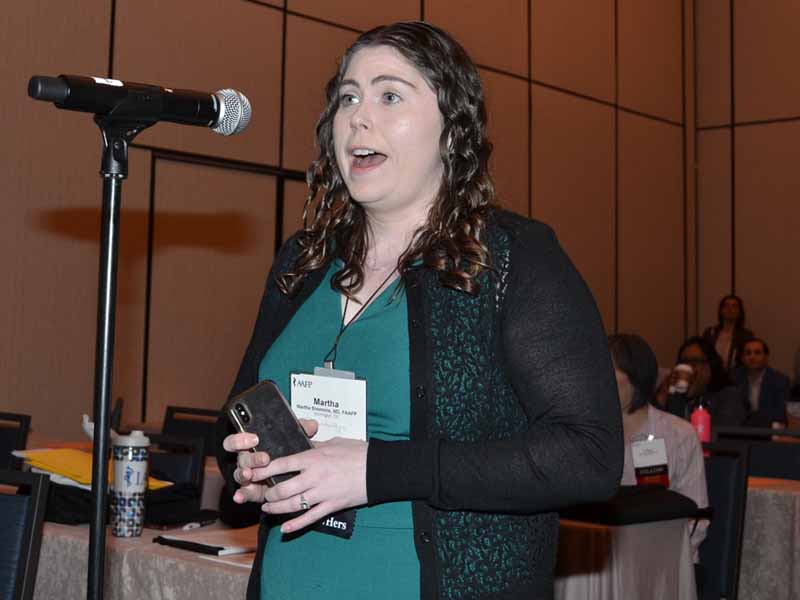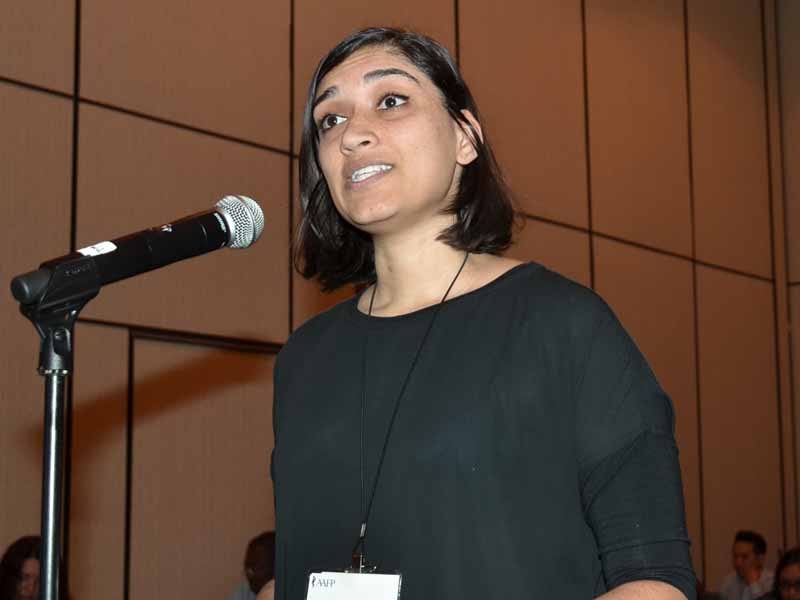Member Constituency Delegates Reject Purity Politics for PAC
April 30, 2019 03:14 pm David Mitchell Kansas City, Mo. – Delegates to the AAFP's National Conference of Constituency Leaders held here April 25-27 rejected a resolution that would have precluded FamMedPAC, the Academy's political action committee, from donating to other PACs, political campaigns or politicians that endorse policies that are in direct conflict with those of the AAFP.
Rachel Franklin, M.D., a women's delegate from Oklahoma City, said during the April 26 Reference Committee on Organization and Finance hearing that she supported the spirit of the resolution but warned it was not practical for FamMedPAC.
"Telling senators we won't give them money unless they agree with us on every issue is going to keep us off their radar when we want their help with payment reform," Franklin said.
FamMedPAC aims to help elect candidates to the U.S. Congress who support the AAFP's legislative objectives. During the 2016 election cycle, contributions to FamMedPAC topped more than $1 million. Those contributions were distributed in a nonpartisan fashion,

Martha Simmons, M.D., a new physician delegate from Wilmington, Del., testifies during the Reference Committee on Organization and Finance hearing at the 2019 National Conference of Constituency Leaders that FamMedPAC contributions should not be distributed to congressional candidates whose views do not align with those of the Academy.
supporting 56 Democrats and 44 Republicans. During last year's midterm elections, the PAC played a role in electing members of Congress from both parties, dispersing more than $500,000 to more than 100 candidates.
Martha Simmons, M.D., a new physician delegate from Wilmington, Del., testified during the reference committee hearing that where candidates stand on all the issues should matter.
"How the PAC spends money is a huge factor in whether or not I'm going to give money and whether or not a lot of my friends are going to give money," she said.
But Teresa Lovins, M.D., a women's delegate from Columbus, Ind., echoed Franklin's testimony.
"You have to be in the room," she testified. "This resolution would limit us on any 'Hill,' whether it be on the state or national level. I don't want this to pass."
Story Highlights
Ultimately, it did not. The reference committee wrote in its report that the Academy needs to have "a seat at the table" and be able to work with legislators from both sides of the aisle. The resolution, it said, could limit the Academy's visibility with Congress.
Members from the five constituency groups -- women, minorities, new physicians, international medical graduates, and LGBT physicians and those who support LGBT issues -- also acted on other resolutions that were considered by the reference committee, including one intended to make Academy events more welcoming for families.
Delegates adopted an amended substitute measure that called on the AAFP to research options for and implement on-site play areas for children and caregivers during the Family Medicine Experience, National Conference of Family Medicine Residents and Medical Students, and Congress of Delegates. It also called for the Academy to research options for and implement on-site child care services at those same events and NCCL.
The original resolution called for "free or subsidized on-site child care services," but the issue of cost was omitted during the final discussion in the April 27 business session.
Simmons pointed out that the American College of Obstetricians and Gynecologists offers on-site activities for children ages 6 months to 12 years old at its annual meeting for a fee of $5 an hour per child.
Carrie Pierce, M.D., a women's delegate from Klamath Falls, Ore., said during the business session that the availability of child care at Academy events could help more women move into leadership roles in family medicine.
"The more we can get people to events like NCCL, the better off we'll be in the future," she said.
Melissa Hidde, M.D., an LGBT constituency delegate from Green Bay, Wis., agreed. She testified during both the reference committee hearing and the business session that lack of child care prevented her from attending NCCL last year.
"This affects many of us, myself included," she said during the reference committee hearing.
Delegates also acted on a number of other issues.
They rejected a resolution that called for the Academy to launch a media campaign to "promote the value and scope of family medicine." The reference committee said in its report that it heard support for the resolution during the hearing but noted that the AAFP already is planning an initiative that will "address the spirit of the resolution."

Roma Amin, M.D., a minority constituency delegate from Columbus, Ohio, testifies during the April 26 Reference Committee on Organization and Finance hearing about a resolution intended to promote inclusivity at AAFP conferences and events.
Delegates adopted a resolution calling for the Academy to offer supporting memberships to resident physicians who previously trained in family medicine but are currently training in residency programs for other specialties.
Delegates also adopted a resolution calling for the creation of an online community that would allow members to communicate with delegates from other constituency groups. The intention is to "optimize resolution writing" at NCCL.
Related AAFP News Coverage
2019 AAFP Leadership Conference
Family Physicians Voice Questions at Town Hall Meeting
(4/30/2019)
2019 NCCL Delegates Elect New Leaders
(4/27/2019)
2019 NCCL
Family Physicians Learn to Say 'Yes, And …'
(4/26/2019)